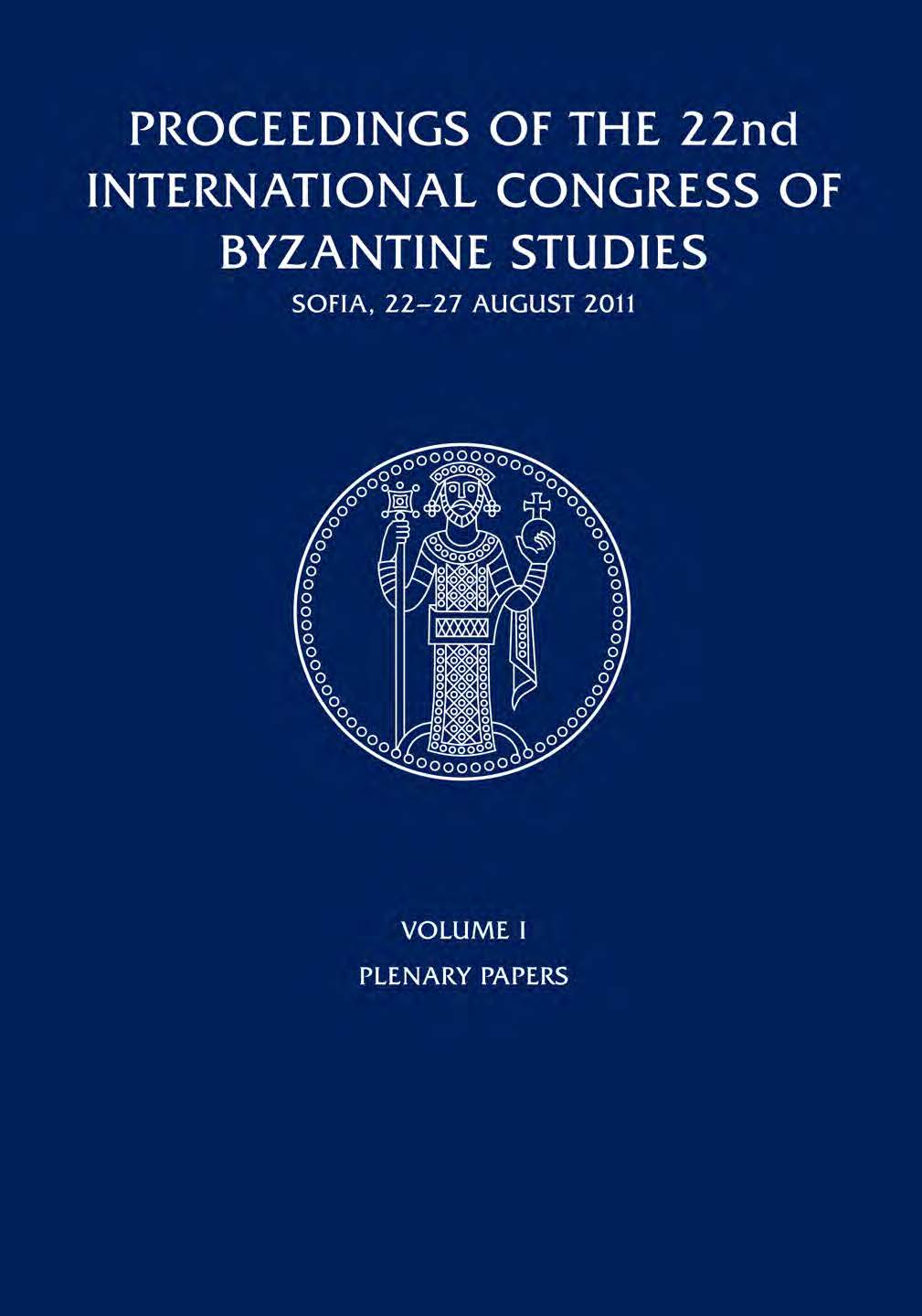
We kindly inform you that, as long as the subject affiliation of our 300.000+ articles is in progress, you might get unsufficient or no results on your third level or second level search. In this case, please broaden your search criteria.

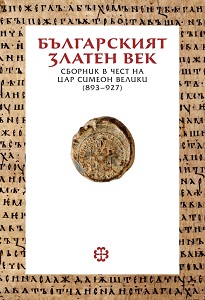





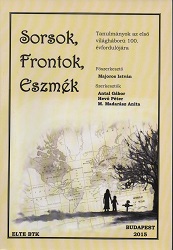
As to my personal project plan for the coming six years on the issue of present concern, I shall in the following present my hypothesis––a hypothesis which is about to take shape, while I am looking up for a moment from behind the heaps of books taken from my bookshelf. The reason why I shall submit my hypothesis at this stage is that I hope that you might prompt me––by expressing your appreciation or doubts to what you read––to advancing new perspectives and new ideas.
More...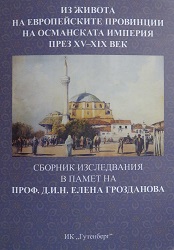
The paper presents in analytical way to Fund of the Ottoman documents about Mecca and Medina, kept in the collections of Oriental Department of the National Library "St St Cyril and Methodius". The documents are grouped in six main sections according to their content. The author presents in annotated form multiple documents of that fund. The paper includes an annex of the inventory of documents from fund Hijaz (Arabia).
More...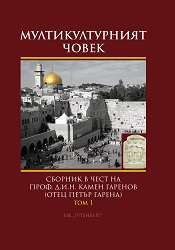
The numerous and once monolithic Bulgarian national enclave, which had lived for many years in the Northern Pryazovia steppes, suffered numerous calamities. The first settlers arrived in the Pryazovia in the summer and fall of 1861 and the settlement was finally completed only in 1863. The social and economic development of the Bulgarian colonies was under the influence of the system of assimilation policy of the Russian Empire in respect to national minourities. In spite of the conditions, some Bulgarian port settlements quickly turned into commercial and industrial centres. The Bulgarian settlers upheld their Bulgarian national identity against the pressure of the assimilation policy mainly by preserving their native language, everyday life, customs, rites, feasts and folklore. In the first years of settlement the Bulgarians, particularly those in the Crimean Peninsula (Tauris) focused on and managed to achieve the opening of schools, at first only in several large settlements and later in all Bulgarian villages. In Preslav there was even a Central Bulgarian School subordinate to the Ministry of State Properties. Russia's assimilatory imperial policy also influenced the cultural development of the Bulgarian settlers. Official lay and church authorities were hostile to the language and some elements of the traditional life of Bulgarians under the pretext that they were heathen. Bees and other youth gatherings of definitely Bulgarian outlook were presecuted. Theatical and other amateur performances n Bulgarian were banned. At the same time, as loyal subjects, Bulgarians were active participants in World War I, in both recruitment and requisition. The Civil War did not pass by the Bulgarian settlements either. In some parts they formed armed bands and became part of the Free Territory organized along anarchist lines. At the establishment of Soviet power, the Ukrainian government was headed on three occasions by the Bulgarian Krustyu Rakovski. When Tauris became Soviet, the mayors, clerks and popular guards who enjoyed confidence in the Bulgarian settlements were s wept away. About then or more thousnad Bulgarians perished in the turbulent period of 1917-1922. The intelligentsia, which usually came from broad-minded affluent families, war a particular victim. The road to inveigle the authorities to grant some cultural (and partly administrative) "autonomisation" of the Tauris Bulgarians was opened with the establishment of a Bulgarian Bureau with the Central Commitee of the Communist Party (Bolshevik) of Ukraine and the publication of the 'Surp i Chuk' (Hammer and Sickle) newspaper in Bulgarian. The resistant against collectivization and the subsequent artificially induced famine in 1932-1933 cost the live of 20 000 Tauris Bulgarians. This also continued during the unprecedented Great Purge until Stalin's death in 1953 to which many Ukrainian Bulgarians fell victim.
More...
The life and work of the Turkish journalist and publicist M. N. Deliorman, packed as they are with plenty of valuable information about the history of the Turkish community and the political history of Bulgaria, deserve to be reached. After presenting the most important points in the biography of M. N. Deliorman, this paper discusses in great detail his reports from Bulgaria, which he sent as a correspondent in the course of nearly two months directly after the coup on September 9, 1944.
More...
Trinaesti kongres Saveza komunista Jugoslavije, polazeći od izvornih principa politike nesvrstanosti, izražava punu solidarnost i pruža bezrezervnu podršku borbi naroda Juga Afrike za ukidanje režima aparthejda, za eliminiranje posljednjeg uporišta politike kolonijalizma, za slobodu i ravnopravnost, za ostvarivanje prava na samoopredjeljenje i za svestranu emancipaciju i društveni progres zemalja Juga Afrike.
More...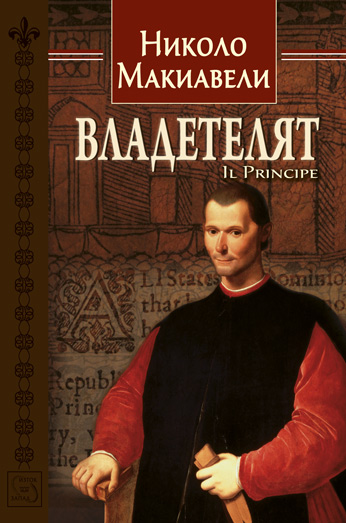
„The Prince” was written by Niccolo' Machiavelli in the 1500s. It has continued to be a best seller in many languages. The Prince is a classic book that explores the attainment, maintenance, and utilization of political power in the western world. Machiavelli wrote The Prince to demonstrate his skill in the art of the state, presenting advice on how a prince might acquire and hold power. Machiavelli defended the notion of rule by force rather than by law. Accordingly, The Prince seems to rationalize a number of actions done solely to perpetuate power. It is an examination of power-its attainment, development, and successful use.
More...
Крагујевац 10. Фебруара; Са велике школе; Из записника Небојше; Народној скупштини: Штудије о стању пољске привреде у Србији; Предлог за нов грађански поступак у округу (кантону) циришком; Спољна политика немачка; ДОПИСИ; Крагујевачка новост; Мојим ђацима у крагујевачкој гимназији; Књижевна вест; ОГЛАСИ; ФАБРИКА ШЕШИРА КОД ЗЛАТНОГ ЧИЛИНДЕРА на бившој Стамбол-капији;
More...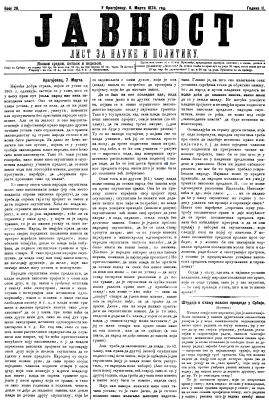
Крагујевац, 7. Марта; Штудије о стању пољске привреде у Србији; Најновији научни предлог; ДОПИСИ; Јевропска дипломација и афера босанска; РАЗЛИЧНОСТИ; Уредништву ''Јавности''; ПРИПОСЛАНО; ОГЛАСИ; На знање;
More...
Srpska spoljna politika zasnovana je na trostrukom nerazumevanju nesvrstavanja: ključni značaj politike prema Izraelu, beskorisnost kada je reč o unutrašnjoj stabilnosti i bezbednosti i irelevantnost u unipolarnom ili multipolarnom svetu. Kada danas neko pomene samoupravljanje, sećanje je, onih koji se sećaju, na dobra vremena. Ni razlozi za uvođenje toga sistema, a ni njegove neprirodnosti se više ne znaju. Isto se sada događa sa politikom nesvrstavanja. Zemlja je bila uticajna – to je ono što se stalno ističe. Ne govori se ozbiljno o razlozima za izbor upravo takve spoljne politike, ne ističe se njen stvarni značaj, ne cene se posledice i ne razmatra se da li je zaista ugled zemlje bio toliki koliki je bio zbog politike nesvrstavanja? Zbog toga, možda, ima smisla posvetiti nekoliko rečenica tim pitanjima. Na kraju još samo kratak komentar o politici svrstavanja u Evropsku uniju.
More...
Vremenom se učvrstila neka vrsta zvanične verzije naše novije istorije, na koju se oslanjaju kako oni koji u nju iskreno veruju tako i oni koji neće da se zamere nacionalnoj javnosti, naročito ako traže uspeha u mainstream politici i mainstream institucijama. Mada podrobna istraživanja još predstoje, temelje ovoj verziji položili su propaganda u eri Slobodana Miloševića, neki generali JNA, rodoljubivi istoričari i drugi nacionalni pregaoci i RTS u svim verzijama, žešćim i blažim. Ovo je pokušaj da se taj skraćeni kurs o bliskoj prošlosti što vernije i bez zlobe rekonstruiše i izrazi neutralnim rečnikom. Nije reč o istoriografskom tekstu nego o želji da se dešifruje i prepriča jedno uvreženo mišljenje. Ovaj napis nema nikakvu literarnu vrednost – ili poseduje samo onu koju ima iskaz svedoka kako ga je sudija izdiktirao zapisničarki. Zato nije mnogo važno označavati šta je u toj verziji tačno ili netačno. Kao što će se videti, ima i jednog i drugog – i mnogo čega protivrečnog.
More...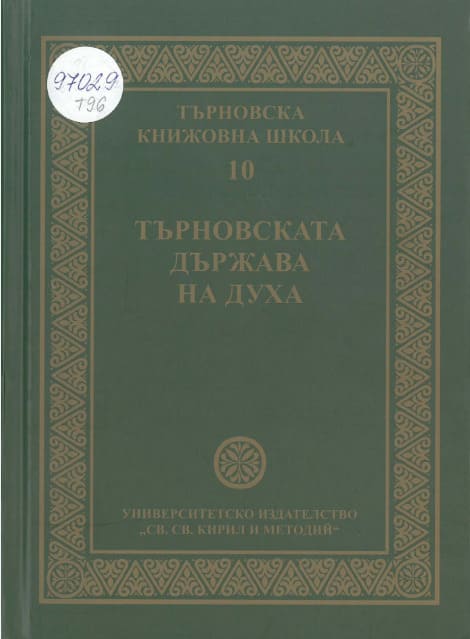
The 𝑇𝑎𝑟𝑛𝑜𝑣𝑜 𝐿𝑖𝑡𝑒𝑟𝑎𝑟𝑦 𝑆𝑐ℎ𝑜𝑜𝑙 collections contain reports from the recurrent international symposium “Tarnovo Literary School”, which is the oldest and most respected forum on Old Bulgarian studies in Bulgaria and worldwide. It was held for the first time in 1971 under the auspices of UNESCO, and the first collection of articles came out in 1976. The𝑇𝑎𝑟𝑛𝑜𝑣𝑜 𝐿𝑖𝑡𝑒𝑟𝑎𝑟𝑦 𝑆𝑐ℎ𝑜𝑜𝑙 collections are among the most cited editions in the fields of Old Bulgarian studies and research into medieval Bulgarian spiritual and material culture from its pre-Tarnovo and Tarnovo periods, as well as on the cultural and literary ties between Byzantium, Bulgaria, and the Eastern Orthodox Slavic world. The main purpose of 𝑇𝑎𝑟𝑛𝑜𝑣𝑜 𝐿𝑖𝑡𝑒𝑟𝑎𝑟𝑦 𝑆𝑐ℎ𝑜𝑜𝑙 is to publish scholarly articles by Bulgarian and foreign researchers in the field of interdisciplinary medieval studies in order to explore the cultural and historical heritage of the Second Bulgarian Empire.
More...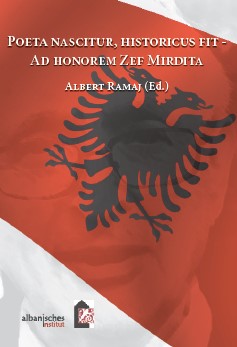
The book before you is dedicated to our dear colleague and friend Zef Mirdita. In this way, we want to thank him for his exceptionally fruitful, almost 50-year scientific work, and especially for the days he has spent and still spends with us at the Croatian Institute of History in Zagreb from 1993 to the present day. Professor Mirdita has also been an honorary member and advisor of the Albanian Institute (Albanisches Institut) in St. Gallen (Switzerland) since its foundation in 2002. Although he retired in 2004, the scientific community of the Croatian Institute of History will always consider him its distinguished member whose research results are an indispensable part of not only Croatian and Albanian but also European historiography. His life and scientific path took place (and still actively takes place) between Croatia and Albanians (especially Kosovo).
More...
Already in mid 1990s the diplomats of the independent state of Slovenia undertook the activities aimed at professionalization of Slovenian diplomacy. After the consultation with the then President of the National Assembly Janez Podobnik, a number of professional diplomats assumed the leading positions in Slovenian embassies. However, that was only the beginning of long-lasting efforts. Slovenian diplomacy and even its highest positions were still staffed by people coming from the fields that were not much related to diplomacy, and they were often appointed for only one term of office. There have been about 70 such members of embassy staff appointed for only one term of office who then quit this profession, which is a very high number for Slovenia. Career diplomats were justifiably dissatisfied with the situation. Eventually, the law was amended last year to stipulate that the ambassador may only be a person who is a diplomat, which means that he/she has to be employed at the Ministry of Foreign Affairs and have at least seven years of practical experience at that Ministry.
More...